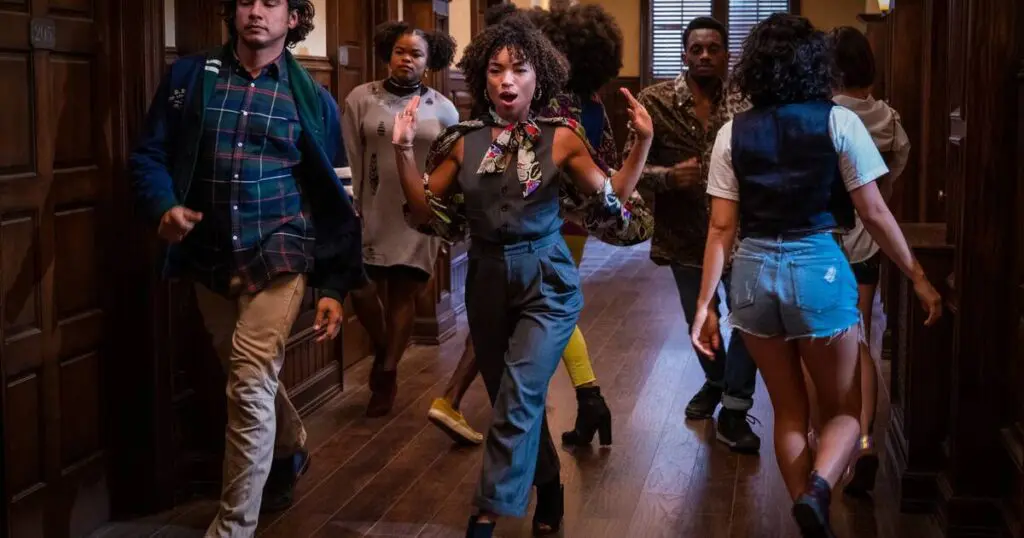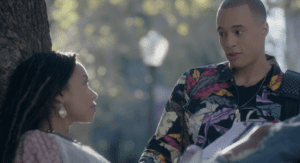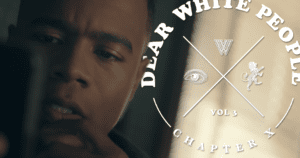Summary
For musical nerds and fans of college-based dramas, this is for you.
This recap of Netflix’s Dear White People season 4, episode 10 — the ending explained — contains spoilers. You can check out our spoiler-free season review by clicking these words.
The final episode of Dear White People brings us to a bittersweet end. From the beginning of the season, we were transported into the future with a pandemic and video calls — similar to the times we currently live in — but seeing how Sam, Lionel, Troy, Joelle, Reggie, and Coco reflect on their senior year at Winchester is by far the most enjoyable part of the episode.
As we know, the entire premise of Volume 4 is based on a musical show. Now, not everybody is a fan of musicals but as a former theatre kid and musical nerd, I was very excited to see how the characters would be bursting into song and dance, showcasing their emotions and much more. With that, the Varsity Show is being held in Beckford Hall, which is named after a white slave owner and for obvious reasons, many Black students at Winchester are protesting against the 90s R&B musical. Instead, Black AF (the Black American Forum, a student union underneath the Black Caucus) are vehemently against the musical with the vibrant and unapologetic freshman, Iesha, taking the lead on this.
Dear White People season 4, episode 10
Now, Iesha is an interesting character that constantly grinds Sam’s gears — as she should — because Sam is the palatable one, she’s biracial and can ease her way into Black spaces and advocate for the rights of Black students at Winchester, yet she’s oblivious to the fact she is part white and has an arguably problematic white boyfriend, Gabe. Essentially, Sam has met her match with Iesha constantly calling her out (rightfully so) because Sam is sometimes all talk, meanwhile Iesha gets everything done.
During career day, Reggie received a bunch of tech offers from these rich corporations and has been questioning whether it’s worth taking these offers. Now, we know that Reggie and Joelle have been a couple but they are going through some mess — with Reggie’s inconsistency and lack of communication and consideration for Joelle, it’s not surprising that she’s upset with him as they both planned to spend their lives together. But bring Iesha into the mix and we see how it changes. In the previous volumes of Dear White People, Reggie had a negative encounter with the police and is still affected by this. To ease his nerves, Iesha brought him to a gun range to face his fears and much to Joelle’s chagrin, he ends up getting a gun. Now, it’s also important to note that Reggie’s extremely intelligent and invested in tech and all things Black community, so he also developed an app to track white supremacists and keep Black people informed about the racists in their vicinity.
With Dear White People, it’s refreshing to see Lionel come into his true self in his senior year but he still has some minor insecurities to uncover. For instance, during the evening of the musical, he gets into an argument that upset him and Sam, being the annoying protagonist, captured his footage and mentioned how he’s the highlight of her film. This is another reason I felt Sam to be a frustrating character because she’s exploiting his vulnerable moments for a film. The same evening, on Reggie’s way to the musical, Iesha is front and center leading the protest for the musical and arguably guilt trips other Black people in support of the ‘minstrel show’ (her words). I found the dichotomy interesting because it highlighted the division between the Black students on campus and the musical, especially as Reggie is the typical political activist type of student. Despite her protest, he still continued to ignore her.
As he enters the hall, he receives a flood of notifications on his phone about a white supremacist on campus, following the numerous videos shared on social media earlier. But, the show begins. A tale of 90s R&B, protest, song, and dance — the acting mirrored the reality of the protest that Iesha was leading outside. Instead, Iesha comes in with her megaphone and the cast stops their musical, realizing how they are protesting racism and anti Blackness in a musical, meanwhile the real one is happening outside. I found this scene to be super interesting because of the parallel and how the students realized the power of protest. As everyone leaves, Reggie spots the white supremacist who pulls out a gun but lucky for Reggie, he was first to shoot, leaving the racist dead on Winchester property. But he’s still unlucky — being a Black man with a gun at an Ivy League, he saved hundreds of people but he ended up being profiled as the walking stereotype with a gun.
The ending
Finally, we’re back to the future and the mini-reunion. It was so lovely to see everyone together from their Winchester days with the filmmaker couple, Sam and Gabe, Joelle, political maven Coco, industry giant Troy and of course, the author Lionel. The crew didn’t expect Reggie to show up to the reunion as he went off the grid for years following that night at Winchester. From his picture being used as recruitment for white supremacist groups and much more, it made sense for him to come off the grid. Even years down the line, Lionel is still facing the same issues with his writing — Blackness — with publicists offering him deals to write memoirs about Blackness. Troy left his job after his film CasablacKKKa flopped at the box office, which meant that the book and film by Lionel and Sam wouldn’t have funding. Despite this, the crew shares their support and emphasizes how they will support, like old times at Winchester and the episode ends with the group looking at the camera in unity.
I’ve been watching Dear White People since it came out with a Netflix movie and the other volumes and I think the series ended well — from the musical, bringing us to the future, incorporating relatable aspects of our lives with the pandemic, the experiences of Black students at elite institutions, how Coco and Iesha actively call out the lightskin/biracial privilege of some characters. For me, it was perfect and deserves 5 stars. Some characters might frustrate you but it’s all part of the show.
What did you think of Netflix’s Dear White People season 4, episode 10? Comment below.




